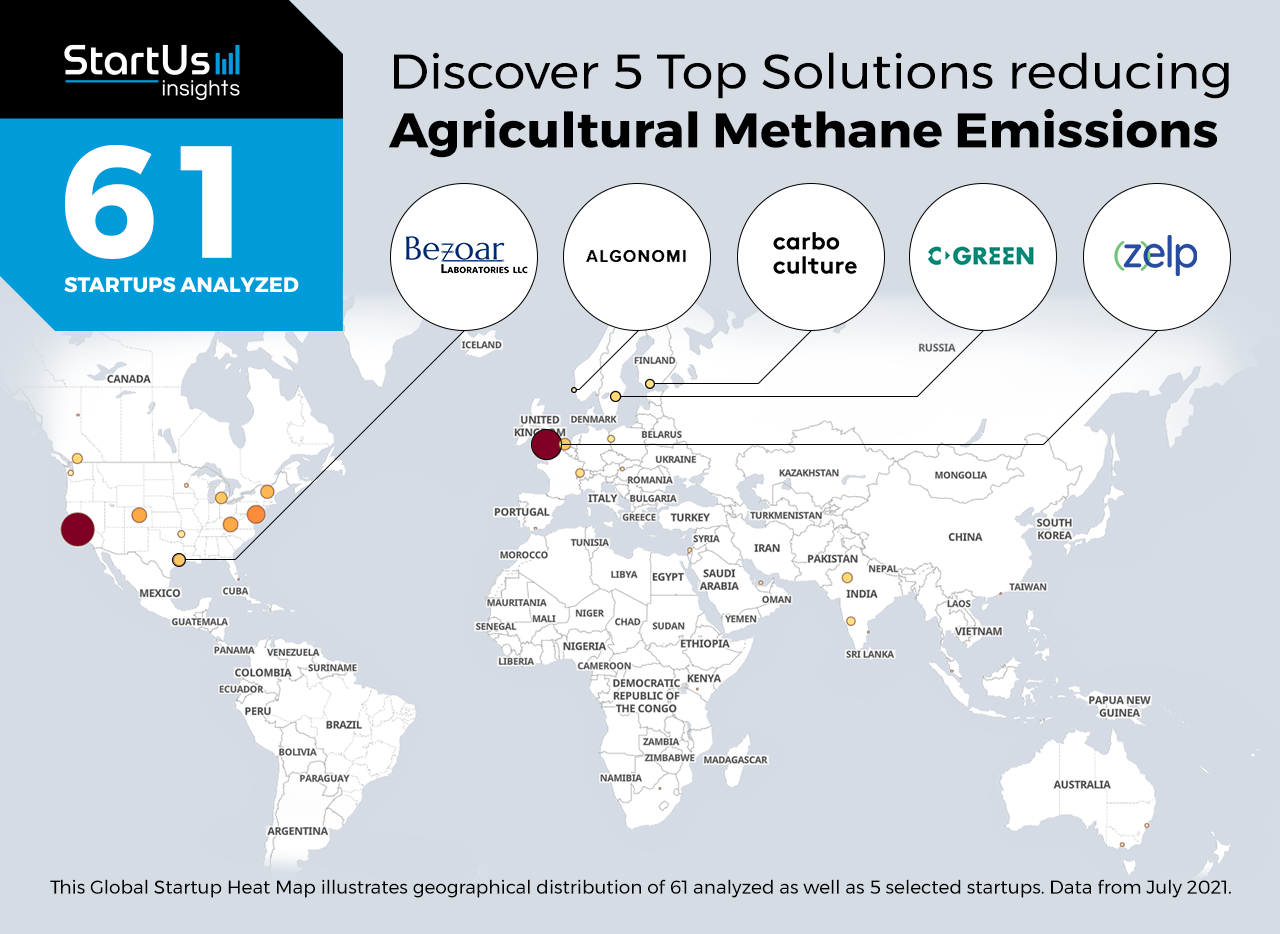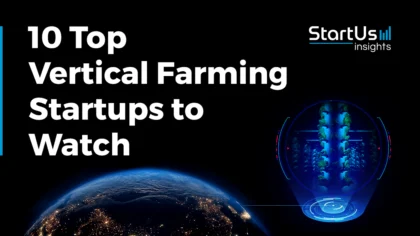Staying ahead of the technology curve means strengthening your competitive advantage. That is why we give you data-driven innovation insights into the agriculture industry. This time, you get to discover 5 hand-picked solutions reducing agricultural methane emissions.
Global Startup Heat Map highlights 5 Top Solutions reducing Agricultural Methane Emissions
The insights of this data-driven analysis are derived from the Big Data & Artificial Intelligence-powered StartUs Insights Discovery Platform, covering 2.093.000+ startups & scaleups globally. The platform gives you an exhaustive overview of emerging technologies & relevant startups within a specific field in just a few clicks.
The Global Startup Heat Map below reveals the distribution of the 61 exemplary startups & scaleups we analyzed for this research. Further, it highlights 5 AgriTech startups that we hand-picked based on criteria such as founding year, location, funding raised, and more. You get to explore the solutions of these 5 startups & scaleups in this report. For insights on the other 56 solutions reducing agricultural methane emissions, get in touch.
Algonomi produces Algae-based Bioactive Ingredients
The global agricultural industry is among the largest sources of greenhouse gas (GHG) producers, with methane contributing a large portion of these emissions. In addition, the agriculture industry is constantly increasing the amount of livestock being raised to meet the rising global demand. However, this results in more methane emissions being released into the atmosphere. To reduce the negative impact on the environment while increasing production, startups are utilizing algae to create bioactives that lower methane production in livestock.
Norweigan startup Algonomi specializes in creating bioactive ingredients through the cultivation of microalgae biomass. Animal feed made with their microalga increases cow feed digestibility while simultaneously reducing methane emissions of cows, which significantly aids in combating climate change. Additionally, the production process of the algae reduces CO2 from the atmosphere, by taking CO2 from industrial processes to cultivate the algae.
Carbonculture creates Feedstock Conversion Technology
The agriculture industry produces a high volume of residue or waste that stems from post-processing or harvesting. Currently, this waste ends up in landfills or incinerators, contributing to greenhouse gas emissions as the carbon stored within them is released into the atmosphere. Startups are developing solutions to reduce the emission of greenhouse gasses by converting agricultural residue into valuable products.
Finnish startup Carbon Culture is developing technology for ultra-fast, carbon conversion using biochar. Their technology process uses high temperatures, creates no bio-tars, and produces a consistent, high purity, low ash material. Additionally, the after gasses resulting from the conversion process are burned, however, compared to conventional burning processes, no methane is emitted.
Bezoar Laboratories creates Microbial Feed Additives
The cattle industry is increasingly investing in the development of feed-based solutions to reduce the emissions of methane from livestock. However, many feed-based emission reduction products use artificial ingredients which decrease the acceptance within the agricultural industry. Artificial products also potentially introduce long-term negative effects or highly resistant bacteria which is why startups are creating natural-feed solutions.
US-based startup Bezoar Laboratories develops microbial feed additives that reduce cattle methane emission and nitrate poisoning. It utilizes Paenibacillus fortis, a patent-pending cattle probiotic that, when paired with nitrate, decreases methane emissions and pathogens from cattle. This solution also significantly reduces nitrate poisoning among cattle and is cost-effective for the agriculture industry to adopt on large scales.
C-Green creates Solid Waste Processing Technology
Livestock waste is one of the largest sources of methane emissions in the agriculture industry. Feed-based solutions minimize the methane produced by animals but do not eliminate them as the gas is still released into the atmosphere without being treated. This is why startups are creating solid waste processing solutions that reduce the emissions of potent gases such as methane.
Swedish startup C-Green provides the technology to convert wet biowaste into solid bio-coal. The startup’s solution, OxyPower HTC, combines two technologies, hydrothermal carbonization (HTC) and wet oxidation, for wet biowaste handling. The process treats sludge in an HTC reactor The organic content in the aqueous phase is then wet oxidized under pressure decomposing it into CO₂, water, and easily biodegradable organic acids. This process immediately and effectively halts the degradation of sludge, reducing the emissions of methane and nitrous oxide.
Zelp reduces Cattle Methane Emissions
In general, livestock produces methane emissions either through their excrements or via the breath they exhale. Current solutions only aim at reducing methane from excretion and ignore methane generated from cattle’s breath. To completely eliminate or minimize the impact of methane emissions from cattle, startups are developing equipment to neutralize the methane from the breath of cattle.
British startup Zelp manufactures a harness worn by cattle over their head to reduce greenhouse gases from their breath. The easy to install device records statistical data and uses big data analytics to quantify and track methane emission reduction targets. Additionally, the device contains a GPS tracker, heat detection, disease monitor, and a real-time methane oxidation monitor. Their solutions eliminate one of the major sources of methane from cows without any negative impact on the lifestyle or comfort of animals.
Discover more AgriTech Startups
AgriTech startups such as the examples highlighted in this report focus on sustainability, waste upcycling, as well as climate-friendly animal agriculture. While all of these technologies play a major role in advancing the agricultural industry, they only represent the tip of the iceberg. To explore more agricultural technologies, simply get in touch to let us look into your areas of interest. For a more general overview, you can download our free AgriTech Innovation Report to save your time and improve strategic decision-making.




![AI in Agriculture: A Strategic Guide for Industry Leaders [2025-2030]](https://www.startus-insights.com/wp-content/uploads/2025/03/AI-in-Agriculture-SharedImg-StartUs-Insights-noresize-420x236.webp)




